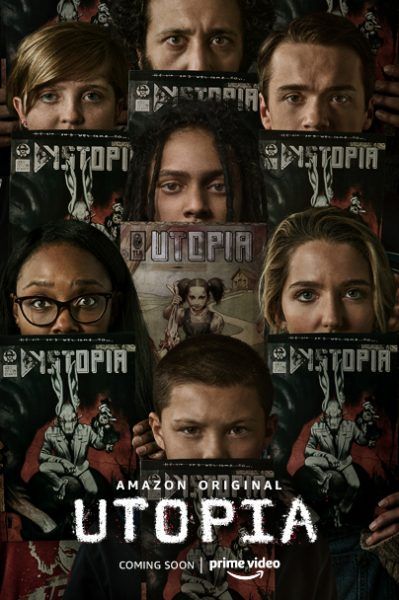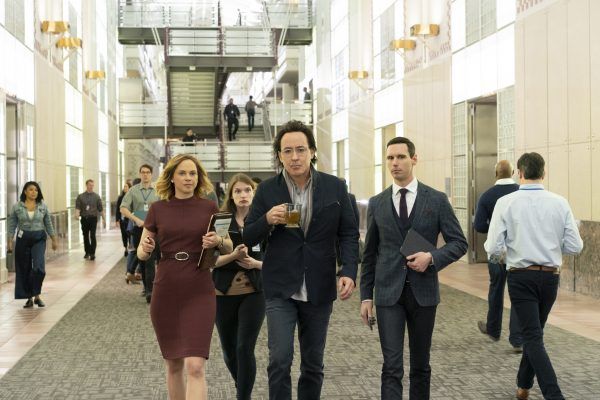From showrunner Gillian Flynn and inspired by the original British series, the Amazon Prime Video eight-episode conspiracy thriller Utopia follows a group of comic book fans who have bonded over their obsession with a seemingly fictional comic that they quickly realize is not only very real but very dangerous, as it predicts threats to humanity. As they find themselves trapped in life-or-death stakes involving the comic’s central character Jessica Hyde (Sasha Lane), this group of friends – Becky (Ashleigh LaThrop), Ian (Dan Byrd), Samantha (Jessica Rothe), Wilson Wilson (Desmin Borges) and Grant (Javon “Wanna” Walton) – have to step up in a big way, if they’re even going to have a chance at succeeding in their mission to save the world.
During this 1-on-1 phone interview with Collider, executive producer/writer Gillian Flynn talked about writing messy female characters, what she loves about Jessica Hyde, what comic books meant to her growing up, how this series evolved from a collaboration with David Fincher to what it is now, the changes that were made to the story, and figuring out the best place to end the season, with the hope for a Season 2.
Collider: You write some of the messiest female characters, and Jessica Hyde is certainly no exception to that. What do you love about Jessica Hyde, as a character? What did you most enjoy about telling her story?
GILLIAN FLYNN: I like that she’s a female character with a dark side. Certainly, I love writing those kinds of characters, but Jessica is probably the most feral and unchained of any of my characters. Camille in Sharp Objects hurts herself. Amy Dunne (in Gone Girl) is mentally diabolical. Libby in Dark Places is probably the closest. She really will haul off and punch someone if she needs to. She’s been through a lot more and is on the offense. I liked that Jessica was someone who truly had arrested development at probably around age 12. It was through me figuring out what her backstory was, where she came from, and why she was like that, that I was able to create the idea of Home and the whole mythology that comes into play in Episode 8 and that hopefully we’ll be playing out a lot with Season 2.
As someone who’s admitted to being a pop culture nerd who’s spent a lot of time at comic book stores, how do you think you would have felt, if you’d heard about this type of situation with this super mysterious sequel to an already mysterious graphic novel?
FLYNN: Oh, my gosh. A lot of my childhood was just wishing desperately that the characters I read were true, or pretending that they were my friends, and literally launching myself from my bed into the door mirror five feet away, thinking that I could go through the looking glass. It was a little bit of a wish fulfillment thing, for sure. That’s also when I know I’m figuring out a character, as a writer. I’ll start seeing the world through their eyes, not as if I’m acting as them, but I’ll be standing in line and someone’s checking out at the grocery store with 20 items in the 10 item lane, and I’ll be like, “Oh, Amy Dunne would not put up with this. She’d be saying this and this and this.” So, that idea of someone coming to life is very appealing.
From what it sounds, this project came about when David Fincher was directing Gone Girl, invited you to the set, and proposed collaborating on this remake of Utopia. What was it that led you to say yes, at that time? Was it simply working with him again, or was it this specific story and the characters?
FLYNN: It was both. I don’t think anyone has had a better first experience as a novelist to screenwriter than I had on Gone Girl, to the point where I was like, “What’s this fake mythology about writers having a hard time in Hollywood? It’s the best! What a bunch of babies.” I had no idea. And so, part of it was just that he had approached me when we were still filming Gone Girl, at the time, and it was like, “Let’s keep the band together. That sounds amazing.” And then, it was seeing what this show was. The great thing about Dennis Kelly’s show was that there’s so much to it that I knew there would be tons of different entry points. I liked that there were parts of it that I could really play with and make my own. I really liked the conspiracy angle, in particular. This was back in 2013, and it’s only become more true, the idea of what is true and what is a lie, who’s spinning, who’s telling a falsehood, who’s on the edge of truth, etc. It just felt like we were at such a good time to tackle that again and to have this great story that’s about where we are as humans, globally and politically. There was so much there that it was literally a big world to play in. I’ve tackled themes, certainly, but I tend to do it by going close in and going under a microscope. I’ll go under a roof and examine gender and marriage through the point of view of two people, or mothers and daughters, or close relationships, and doing it that way. I liked that this was literally a giant, huge world that was talking about humanity. I also liked that it was an ensemble. Aside from Widows, I had never done an ensemble before. I tend to write a psychological thriller that really focuses on just a few characters, so I liked this would give me the opportunity to play multiple characters and points of view and challenge me, in that way.
Obviously, it’s evolved since initially deciding to do this. David Fincher is no longer a part of it, it moved over to Amazon, and the episode count went from ten to nine to eight episodes. Were there any major changes that shifted things in a big way?
FLYNN: The biggest one I can think of is that when it had been an HBO, it was set in the near future. It was the year 2023, which at the time was 10 years in the future. It was really playing on the way choices we’ve made come to fruition but doing it in smaller, subtle ways. I was really interested in what was going to happen in the environment. At the time in the news, for instance, water wars had been a big thing. Was it Cape Town, where they were doing a countdown to when the city would run out of water, at the time? So, I was playing on that. Even in people’s homes, you would have to put in a token to get water. There was no such thing as unlimited water in a tap, and things like that. We ended up just changing it to current day. Otherwise, it was losing script but it was just being more precise than necessarily cutting out big swaths.
How was it to figure out where to end the season? What made you decide to end it where and how you did, and were you thinking ahead to how to set that up for a possible Season 2?
FLYNN: The only things that I knew for sure I wanted to get to is that I wanted to get Jessica home. After spending all season talking about, “You need to get Home,” I wanted us to at least get a real glimpse of Home. I knew that had to happen. And I wanted to scatter all the characters in a very classic cliffhanger way of, “Were are our heroes now?,” so that everyone is on different, and in some cases wildly different, trajectories and that there are enough twists to play with about where allegiances are. Those were the two big things I wanted to do.
Utopia is available to stream at Amazon Prime Video on September 25.
Christina Radish is a Senior Reporter of Film, TV, and Theme Parks for Collider. You can follow her on Twitter @ChristinaRadish.



